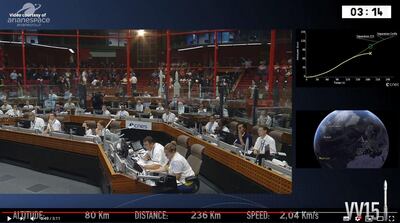An independent inquiry commission has been appointed to assess what caused the failure of a rocket launch carrying a UAE satellite on Thursday.
The European Space Agency and Arianespace, the launch provider, appointed the commission immediately after the failure, the company said in a statement.
This commission is tasked with analysing the reasons for the failure and identifying the measures needed to resume Vega flights while fulfilling all safety and security conditions. The commission is co-chaired by the Inspector General of the ESA and the Senior Vice President of Technical and Quality at Arianespace.
Flight VV15, the 15th Vega rocket to be launched by Arianespace, successfully lifted off from Guiana Space Centre, in French Guiana on the eastern coast of South America, on Thursday at 5.53am UAE time. But, about two minutes later, a launcher anomaly occurred and caused the unmanned mission to fail.

Initial assessments show that the failure happened right after the ignition of the second stage, causing a deviation in the rocket's orbit and a loss of trajectory.
The Vega rocket was carrying the UAE's fourth reconnaissance satellite, Falcon Eye 1. Wam, the UAE's state news agency, said the satellite had been lost in space as a result but added that preparations were under way to launch Falcon Eye 2, as part of the overall Falcon Eye satellite system.
The Falcon Eye 1 satellite was due to orbit the Earth for the next 10 years, providing high-definition images from around the world for military and civilian use.
Thursday's failure was the first for a Vega rocket after 14 successful launches in a row at Guiana Space Centre since 2012.

